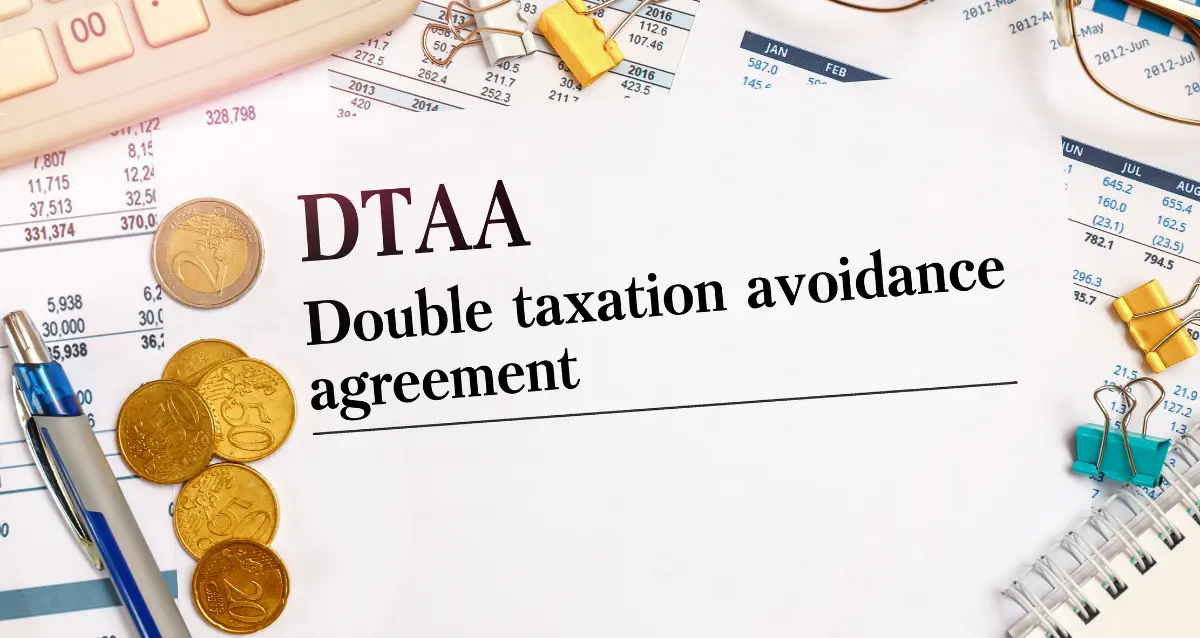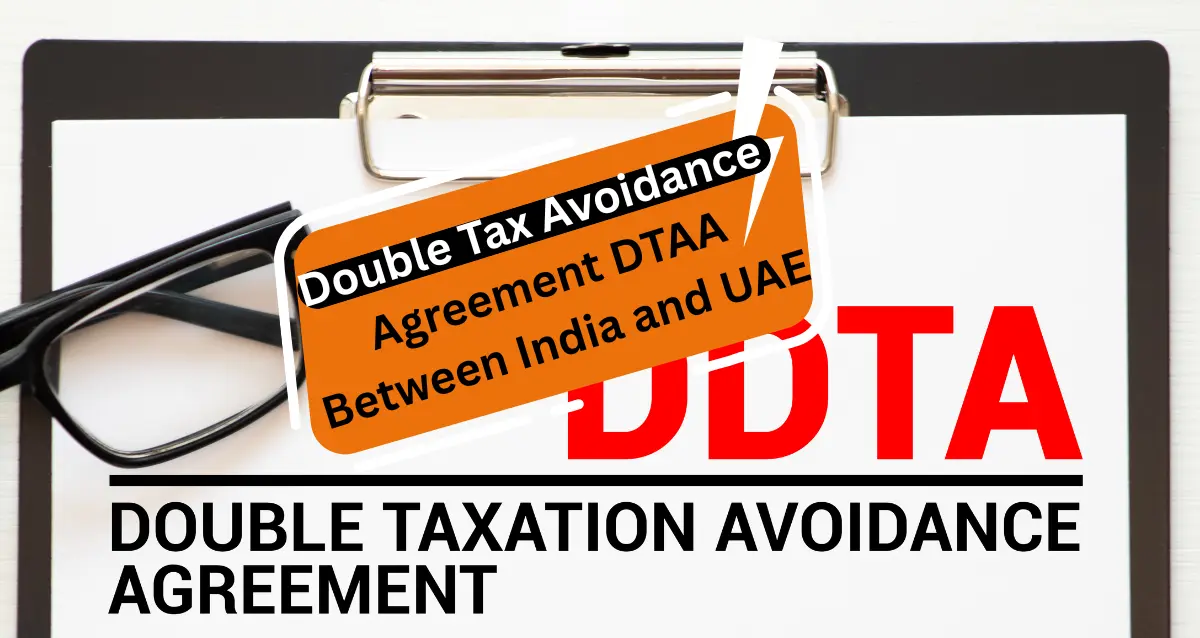Introduction
Many Indians live and work in the United Arab Emirates. Since the UAE has no personal income tax, many people are unsure about how their UAE income is taxed in India. This is why the Double Tax Avoidance Agreement between India and the UAE is important. The India UAE DTAA helps Indian residents avoid paying tax twice on the same income and provides clear tax rules for salary earned in Dubai, Abu Dhabi, and other emirates. This simple guide explains how the DTAA with UAE works, what it covers, and how Indian taxpayers can benefit from it.
What is the DTAA Between India and UAE
The Double Tax Avoidance Agreement DTAA between India and UAE is a treaty that ensures individuals and companies do not pay tax twice on the same income. It helps taxpayers reduce their tax burden and avoid confusion about income tax rules across borders. Since the UAE does not levy personal income tax, Indians earning in Dubai or Abu Dhabi benefit from lower taxes through this agreement. It also confirms that the UAE income of Indian residents will not be taxed in the UAE and will only follow Indian tax laws.
Why the India UAE DTAA Matters for Indian Residents
The DTAA is useful for many reasons. It prevents double taxation, gives clarity on taxation rules, and improves transparency for people with income in both countries. It also boosts trade and investment between India and the UAE. Many Indians earning salary in the UAE worry about Dubai tax or Abu Dhabi tax, but the treaty confirms that salary income from UAE employment is not taxed in the UAE. Instead, it is taxed only in India if the individual is treated as a tax resident of India.
How DTAA Determines Tax Residency
Tax residency is a key point in the treaty. Indian taxpayers must check their number of days spent inside and outside India. If a person stays in India for more than the allowed period under Indian income tax rules, they become an Indian tax resident even if they work in the UAE. In such cases, UAE income needs to be reported in India. Understanding residency rules helps avoid confusion about Dubai tax rate on salary or UAE income tax rates.

Types of Income Covered Under DTAA
The treaty covers several income types including salary, business income, capital gains, interest income, and other categories. For employees working in UAE based companies, salary income is taxed in India only if they qualify as Indian tax residents. Since there is no income tax in Dubai for Indian residents or in any other emirate, the income is not taxed in the UAE at all. For investors and consultants, the treaty explains how business income and capital gains are treated to avoid repeated taxation.
Taxation of Salary Under DTAA
One of the most common questions from Indian workers is about Dubai income tax or tax slabs in Dubai. The UAE currently does not impose personal income tax, so there are no Dubai tax slabs or Dubai income tax slab for salary earners. Under the India UAE DTAA, salary earned in the UAE is taxable only in the country where the work is physically performed. Since work is done in the UAE, the UAE has exclusive taxing rights, but because UAE does not tax salary, the individual benefits from zero tax there. If the person becomes a tax resident of India, the salary may be taxed in India based on Indian rules.
Taxation of Business and Investment Income
For business owners and investors, the DTAA provides additional clarity. Income from business operations, dividends, interest, and capital gains follow specific rules outlined in the treaty. The purpose is to avoid paying tax both in India and the UAE. Many Indian investors in UAE free zones and mainland companies benefit from this treaty since the UAE has a favorable business tax environment.
How DTAA Helps Avoid Double Tax
The treaty includes methods such as exemption and tax credit to ensure that people do not pay tax twice. If income is taxed in one country, the other country provides relief through credit or exemption. This is especially valuable for professionals who earn abroad but maintain tax ties with India.
Comparison With Other DTAA Treaties
India has DTAA treaties with many countries such as Japan. Although the India Japan DTAA provides similar benefits, the India UAE DTAA is unique because the UAE does not tax personal income. This makes the agreement even more beneficial for Indians working in Dubai and Abu Dhabi. The India UAE BIT Bilateral Investment Treaty has also encouraged more investments and cross border partnerships between the two nations.
How Flyingcolour Tax India Can Help
Flyingcolour Tax India offers expert assistance to individuals and businesses who want clarity on their UAE income and DTAA benefits. Our team helps you understand tax residency rules, file taxes in India, claim DTAA relief, and manage income earned in Dubai, Abu Dhabi, and other emirates. If you have questions about Dubai tax, UAE taxation, tax slabs in Dubai, or your global income reporting requirements, our specialists guide you with accurate and up to date information. Flyingcolour Tax India also helps with compliance, tax planning, and cross border advisory for individuals and businesses with UAE connections.
Conclusion
The Double Tax Avoidance Agreement between India and UAE is an important tax treaty for Indian residents working or investing in the UAE. It prevents double taxation, clarifies tax obligations, and ensures that income earned in the UAE is handled fairly and transparently. With more Indians moving to Dubai and Abu Dhabi for career opportunities, understanding DTAA rules is essential. Professional guidance from Flyingcolour Tax India can help you make the best financial decisions and stay fully compliant with both countries tax laws.

FAQ
What is DTAA between India and UAE
The Double Tax Avoidance Agreement between India and UAE is a tax treaty that prevents individuals and companies from paying tax twice on the same income. It helps Indians working or investing in the UAE avoid double taxation and provides clarity on how their UAE income is treated under Indian tax laws.
Is salary earned in Dubai taxable in India
Salary earned in the UAE is not taxed in Dubai or any other emirate because the UAE does not have personal income tax. If an Indian earns salary in the UAE and is considered a tax resident of India, the income may be taxed in India. DTAA rules help clarify how this income should be reported.
Does the UAE have income tax for Indians
No. The UAE does not impose income tax on individuals. There is no income tax in Dubai for Indian residents or any other nationality. Salary, allowances, and most personal earnings are tax free in the UAE.
What is the Dubai tax rate on salary for Indians
There is no Dubai tax rate on salary. Dubai does not levy income tax, so there is no Dubai income tax or Dubai tax slab for employees working in the emirate.
How does DTAA help Indians working in the UAE
DTAA helps Indians avoid double taxation, get tax clarity on foreign income, and understand their tax residency status. It ensures that the same income is not taxed twice and simplifies income reporting for Indians working in Dubai, Abu Dhabi, and other emirates.
Is business income from UAE taxable in India
Business income from the UAE is taxed based on tax residency status. If the person is considered an Indian tax resident, business income may be taxable in India. DTAA rules determine how much relief can be claimed by the taxpayer.
Does India have DTAA with Dubai separately
No. Dubai does not have a separate treaty. The DTAA is signed between India and the entire UAE. It applies to income earned in Dubai, Abu Dhabi, Sharjah, and all other emirates.
Is the India UAE DTAA beneficial for Indian investors
Yes. The treaty helps Indian investors reduce tax burden, avoid double taxation, and get clear rules for income earned from UAE businesses, investments, and capital gains. It encourages cross border investment.
What is the difference between DTAA with UAE and DTAA with Japan
The India UAE DTAA is more beneficial for individuals because the UAE does not levy personal income tax. The India Japan DTAA also avoids double taxation but Japan has its own income tax system, so the tax structure works differently.
To learn more about Double Tax Avoidance Agreement DTAA Between India and UAE, book a free consultation with one of the Flyingcolour team advisors.
Disclaimer: The information provided in this blog is based on our understanding of current tax laws and regulations. It is intended for general informational purposes only and does not constitute professional tax advice, consultation, or representation. The author and publisher are not responsible for any errors or omissions, or for any actions taken based on the information contained in this blog.


